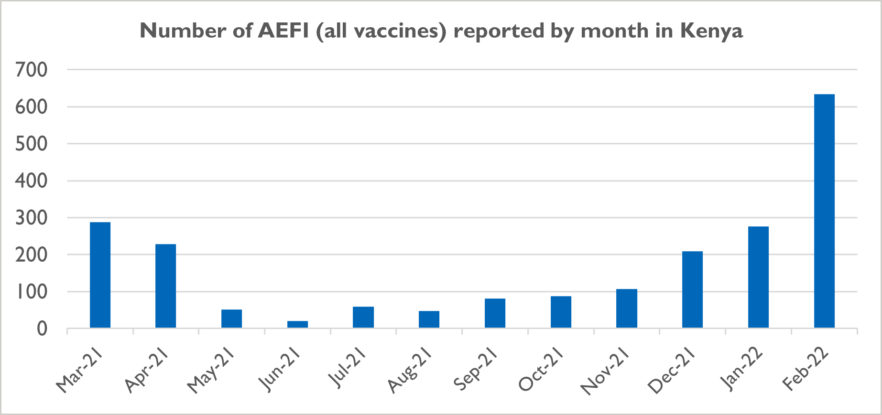Expanding COVID-19 Vaccination Safely, Effectively, and Efficiently in Kenya
In March 2021, when COVID-19 vaccination was introduced in Kenya, health care workers needed to be trained on the features of the multiple vaccines to ensure their effective administration. It was also critical to ensure patient safety, track the vaccine uptake and epidemiology trends, and manage vaccine stock for the success of the immunization campaign—all of which demand proper reporting and data accuracy.
To address these needs, the US Agency for International Development (USAID) Medicines, Technologies, and Pharmaceutical Services (MTaPS) Program assisted the Ministry of Health on multiple fronts of vaccine deployment: policy, planning, and coordination; supply chain logistics management; pharmacovigilance to monitor adverse events following immunization (AEFI); and capacity building of human resources.
Capacity Building
MTaPS, in collaboration with the National Vaccines and Immunization Program and other implementing partners, developed training materials for COVID-19 vaccine deployment on topics such as cold storage, transportation, administration, safety surveillance, and data management and reporting. The program trained 101 master trainers who cascaded the knowledge down to the county and sub-county levels, and eventually to the health facilities, reaching a total of 1,323 health professionals in all 10 MTaPS-supported counties. In addition, USAID MTaPS trained 1,355 health care workers on spontaneous reporting of AEFI with COVID-19 vaccines and investigation of serious AEFI.
Improving Data Quality and Reporting on Vaccine Stock and Safety
To address the COVID-19 vaccine data quality concerns at the facility level (e.g., missing stock data, high wastage of vaccines, and low levels of AEFI reporting), USAID MTaPS worked with the Sub-County Expanded Program on Immunization logisticians and the sub-county health records and information officers to ensure all the COVID-19 vaccinating facilities within their sub-counties could access the national reporting system to enter vaccination data directly. Additionally, USAID MTaPS supported the focus counties to review the data and conduct focused support supervision on COVID-19 vaccines administration and data entry at health facilities, printing and distributing vaccines ledger books to improve documentation of vaccine inventory management.
Support for Development of National and County Level COVID-19 Vaccines Micro Plans
During vaccine introduction, planning was carried out centrally for deploying COVID-19 vaccines to the counties. USAID MTaPS supported the national COVID-19 vaccines procurement and logistics subcommittee to develop and roll out a standardized micro plan template in the country’s 47 counties, enabling decentralized planning for vaccine rollout. Partners were able to further cascade these micro plans to the health facilities.
Results
The number of adults fully vaccinated for COVID-19 in the 10 MTaPS focus counties increased from 460,807 (4.59% of the target population above 18 years) on September 2, 2021, to 4,058,653 (40.5% of the target population above 18 years) on August 31, 2022—an almost 9-fold increase.

NOTE: COVID-19-related – 96.2% Non-COVID-19-related AEFI – 3.8%
Next Steps
USAID MTaPS’ technical assistance provided a platform for sustained roll out and support of COVID-19 vaccines both in the focus counties and nationally. Collaboration efforts with master trainers and partners have ensured reach beyond MTaPS’ operational scope. As the country works toward marking all the facilities offering routine immunization as COVID-19 vaccination centers, lessons learned from MTaPS’ work will inform the scaling up efforts to address gaps. Ongoing facility level mentorship and support supervision, AEFI reporting, awareness building, and targeting health workers and the public will continue to strengthen new and existing interventions as new information emerges on COVID-19 vaccines.